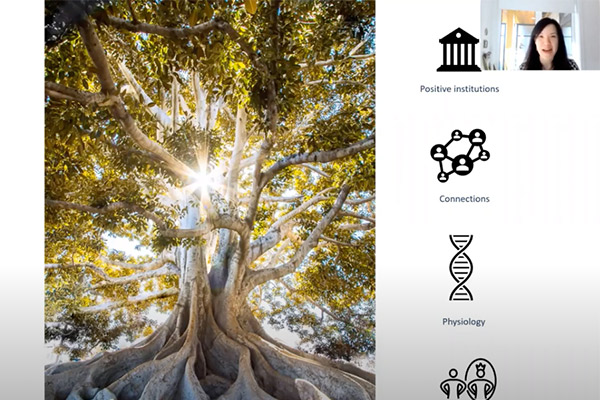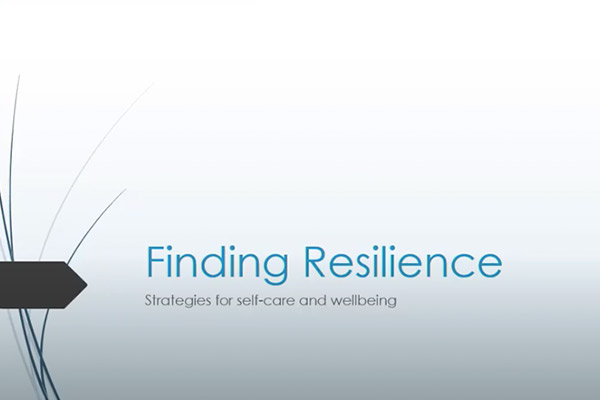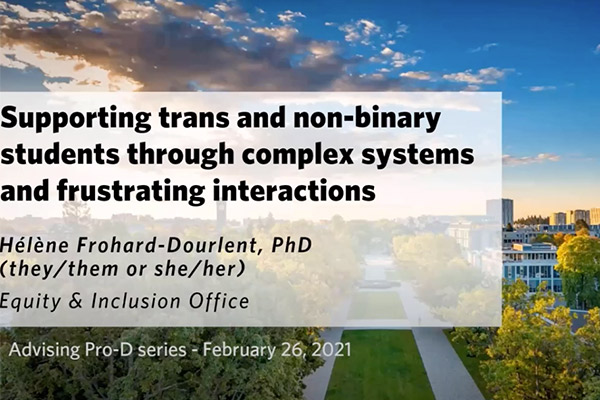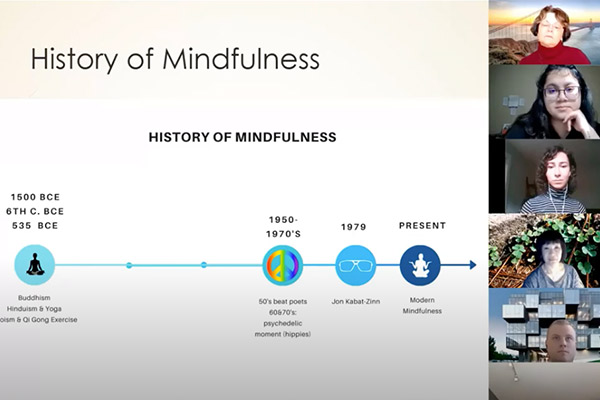
Upcoming Sessions
The Advising Pro-D series will resume in Winter Term 1, 2021. Stay tuned !
Past Sessions
Building Resilience Through Positive Psychology
Facilitators
- Iris Cai, Manager MBA Careers, Business Career Centre, Sauder School of Business
About the session
Traditionally, the paradigm for education success is measured by GPA and employability. There is an increasing need for educators to pay attention to cultivating student well-being which lays a foundation for academic and career success. Especially during a pandemic, it is crucial to cultivate resilience among students proactively to prevent and alleviate mental health challenges.
Through the lens of positive psychology, this workshop explores how faculty and staff can strengthen students’ mental health and resilience by adopting a proactive and strengths-based approach rather than a reactive and deficit-focused approach. Participants will learn about the key factors that build resilience.
Through a case study of how Sauder School of Business’ MBA team incorporates resilience learning into student’s career and professional development programming, participants will also learn how specific tools improving students’ thinking styles, emotional intelligence, and community connections in a virtual environment, etc. have been put into practice.
- Develop a belief that resilience and mental well-being education and academic education is not a zero-sum game and that well-being education can be embedded in existing student interactions and programming
- Gain an understanding of a resilience-building toolkit and examples of how to apply it
- Take away a cheat sheet with a wealth of resources 4. Experience the impact of some interventions first-hand through experiential exercises
Session recording
Session details
- Date: Tue, Feb 16
- Time: 1:00 - 2:30 pm
- Most relevant for: UBC Vancouver & UBC Okanagan | New & Experienced, Staff & Faculty Advisors
Finding Resilience: Strategies for responding to high stress or burnout
Facilitators
- Ciara Moran, Wellness Advisor, Counselling Services
- Michelle Lim, Wellness Advisor, Counselling Services
About the session
This year has presented many unexpected challenges and barriers to accessing our usual coping strategies. For many of us, anxiety and stress are at a constant high and symptoms of burnout may be emerging. In this presentation, we explore the stress cycle and its impact on our ability to feel resilient and competent. We will also share strategies to complete the stress cycle in order to feel more capable and present in our work. Join us to explore the impacts of change, loss, and isolation, and learn concrete techniques for managing in these unique times.
- Understand how the pandemic and the changes of the past year have impacted stress and our ability to manage it.
- Connect with colleagues in their experiences and learn what has been effective for them.
- Gain skills that will help you notice stress and strategies to complete the stress cycle.
Session recording
Session details
- Date: Friday, Feb 19
- Time: 9:30 – 10:30 am
- Most relevant for: UBC Vancouver & UBC Okanagan | New & Experienced, Staff & Faculty Advisors
Co-creating spaces of belonging: a disability as diversity perspective
Facilitators
- Laura Yvonne Bulk, Accessibility Advisor, Centre for Accessibility
About the session
This workshop will be a collaborative and creative learning space in which participants will focus on creating more hospitable spaces for people with disabilities. We will explore small changes and actions that can make a big difference toward creating spaces where everyone can find a sense of belonging.
- Apply knowledge and experience from this workshop and previous experiences to discuss what disability is and appropriate terms to use.
- Describe some types of barriers and facilitators to creating spaces of belonging.
- Discuss respectful ways to interact with disabled colleagues, students, and community members.
- Identify at least one strategy for making your own workplace more welcoming.
Session details
- Date: Tuesday. Feb 23
- Time: 9 – 11am
- Most relevant for: UBC Vancouver & UBC Okanagan | New & Experienced, Staff & Faculty Advisors
Supporting UBC Trans and Non-binary Students as They Navigate Complex Systems and Frustrating Interactions
Facilitators
- Hélène Frohard-Dourlent, Educational Strategist, Equity and Inclusion Office
About the session
Despite ongoing efforts by UBC to create more supportive environments for gender diversity, trans and non-binary students at both the undergraduate and graduate level continue to regularly have frustrating and/or disappointing encounters with UBC systems and sometimes staff. These negative experiences are often the result of inflexible systems combined by a lack of awareness about the negative impact of these systems. They usually leave students feeling at best unseen, at worst uncared for by their own university, which impacts their ability to engage with the campus community and learn to their fullest potential during their time at UBC.
As a student’s primary point of contact, advisors have a unique opportunity to act as change makers and support trans and non-binary students through some of these complex experiences. Support may look like helping with system navigation, building resilience and affirmation, identifying institutional resources and peer support, while building capacity among colleagues, and/or advocating for change on behalf of students. This session aims to build capacity and confidence among advisors, who can then work to support learning about inclusive practices, contribute to systemic change, and build meaningful connections to help trans and non-binary students feel like they belong at UBC.
- Better understand how UBC systems currently create barriers for trans and non-binary students at UBC
- Develop some initial tools and strategies for how you can support students who are navigating complex and unfriendly systems
- Articulate how you might help build capacity among their colleagues (in and beyond advising units) for supporting trans and non-binary students
Session recording
Session details
- Date: Fri, Feb 26, 2021
- Time: 10:45 to Noon
- Most relevant for: UBC Vancouver & UBC Okanagan | New & Experienced, Staff & Faculty Advisors
Building Your Immigration Literacy to Support UBC International Students
Facilitators
- Michelle Suderman, Director, International Student Development
- Shanda Williams, International Student Advisor (RCIC), International Student Development
- Abdallah Khalifa, International Student Advisor (RCIC), International Student Development
About the session
Immigration literacy is foundational to an international student’s ability to thrive at UBC. As integral campus partners in providing holistic student support, you may face inquiries about Canadian immigration policies as student navigate questions like “can I study part-time?”, “do I need a study permit?” or “what is that work permit after finishing UBC?”
Your immigration literacy plays a crucial role in recognizing and supporting this extra layer of an international student’s academic journey and aspirations at UBC. Through scenarios, this workshop will build your knowledge base and enhance your skills to refer students to readily available resources so that they can make well-informed and empowering decisions.
- Increase your understanding of basic immigration concepts and terminology.
- Identify red flags and key steps to refer students to core immigration pathways and resources.
- Practice the application of immigration literacy and set professional boundaries through scenarios.
Session details
- Date: Mon, Mar 1
- Time: 2:30 - 4
- Most relevant for: UBC Vancouver & UBC Okanagan | New & Experienced, Staff & Faculty Advisors
Practice makes Perfect: The Pronunciation and Appreciation of Names in Advising
Facilitators
- Rachael Sullivan, Equity Facilitator, Equity and Inclusion Office
About the session
Our names are powerful representations of identity. They can hold family, cultural and linguistic history, as well as a deep sense of connection to who we are as individuals. The complexity and diversity in our UBC community requires faculty, advisors, and front line UBC staff to demonstrate welcoming and inclusive practices in all our interactions. Research shows that the mispronunciation or avoidance of a student’s or colleague’s name and pronoun(s) can be exclusionary, and impact their sense of belonging and identity. While mispronunciations and misgendering moments are often uncomfortable and/or anxiety producing for both students and advisors, there is a need to navigate these moments with care, concern, and accountability.
As advising professionals, including staff and faculty members at UBC, we need to build awareness, skills, and proficiency at pronouncing unfamiliar names and using peoples’ pronouns in order demonstrate inclusive practices and competency working with diverse students, staff, and faculty. Navigating these moments with understanding and grace will strengthen our connections with students and positively impact advising processes. Informed by both popular texts, videos, and academic research, this workshop will examine how names, pronunciation, and pronouns relate to identity and belonging, and offer tools to help build capacity for inclusive practices.
- Examine current name practices in advising;
- Learn how names and pronouns matter to a variety of students (including students with English as an Additional Language, trans, non-binary and gender non-conforming students) and how name pronunciation and pronoun use can inhibit or enhance the student-advisor relationship;
- Identify advising and relationship-building practices that are inclusive and build connection.
Session details
- Date: Fri, Mar 5
- Time: 10:30 - Noon
- Most relevant for: UBC Vancouver & UBC Okanagan | New & Experienced, Staff & Faculty Advisors
Mindfulness Lenses for Advisors in 2021: Anti-racism, Compassion and Creativity
Facilitators
- Claudia Buffone, Associate Academic Advisor, Faculty of Applied Science
- Mio Tomisawa, Associate Academic Advisor, Faculty of Applied Science
About the session
Mindfulness: to pay attention on purpose, in the present moment, and nonjudgmentally. Whether you are already practicing Mindfulness in your daily activities, or have not yet embraced this effective mode of approaching work and life, there is something for everyone in this interactive presentation. Please join us for a fun, thoughtful, and informative presentation that focuses on why research shows that mindfulness can help all of us to manage life’s myriad of challenges.
Building on last year’s presentation, this is the 2021 edition meant to provide those of us who advise students updated lenses through which to view our advising practices as well as how we conduct our lives outside of the office (virtual or otherwise!). There will be a skit, music, activities, tips and tricks, resource lists, prizes, and even a visit from the Fairy Mindfulness Godmother! Come and spend some time focusing on stepping up your self-care and your care of others.
Session recording
Session details
- Date: Wed, Mar 10
- Time: 11am - noon
- Most relevant for: UBC Vancouver & UBC Okanagan | New & Experienced, Staff & Faculty Advisors
Virtual Facilitation 101: Fostering Engagement and Building Space Online
Facilitators
- Krista Knechtle, Student Engagement Coordinator, Centre for Community Engaged Learning
- Michael Denhamer, Educational Programs Coordinator, Centre for Community Engaged Learning
About the session
Have you needed to facilitate or lead any group conversations online with students or colleagues? Join us for this virtual facilitation workshop as we explore facilitation tools, tips, and techniques to use in virtual group conversations, events and programs. This workshop will support you in creating an equitable and engaging space to build relationships and connect with your students and colleagues.
- Strengthen your ability to create an engaging virtual space
- Examine and utilize digital techniques to foster conversations and focus collaboration
- Recognize the importance of equity and accessibility in planning their virtual facilitations
Session details
- Date: Fri, Mar 12
- Time: 1 - 2:30
- Most relevant for: UBC Vancouver & UBC Okanagan | New & Experienced, Staff & Faculty Advisors
Finding the Path Forward: Reconciliation in Advising at UBC – One Discussion at a Time
Facilitators
- Jolie Ellison, Accessibility Advisor, Centre for Accessibility
- Rachael Sullivan, Equity Facilitator, Equity & Inclusion Office
About the session
Join UBC Advisors for a 6-week exploration of decolonization, Indigenization, and reconciliation through the work of Tanya Talaga’s 2018 Massy Lecture series “All Our Relations: Finding the Path Forward” (audio lectures available on the CBC website). The group will meet every Thursday (April 8 - May 13) at 1:00 pm for an hour of semi-structured discussion. Participants will spend about 12 hours over the 6 weeks, between listening to the lectures, reflecting on the discussion questions, and attending the discussion sessions via Zoom. The group will use the “Pulling Together: A Guide for Front-Line Staff, Students Services, and Advisors” to explore different themes and dynamics, as well as specific discussion questions to guide the learning. The goal is to support UBC Advisors to begin, continue, and/or deepen an understanding of the ways colonialism impacts advising practices at UBC.
Once registered, you will receive a detailed schedule of the weekly discussion topics and questions. In our first meeting, we’ll gather for introductions before working in smaller groups to connect and prepare for engaging with Tanya Talaga’s lectures. Each subsequent session will begin with a land acknowledgement, surfacing of key themes and threads, before moving into small groups to engage with the specific discussion questions identified for the week. We’ll return to the main room for a short debrief and then close the session.
Session details
- Date: 6 Weekly Sessions: April 8, 15, 22, 29, May 6, 13 (Thursdays) * (To best support the shared learning opportunity, participants are expected to attend all six weekly discussion sessions.)
- Time: 1 - 2pm
- Most relevant for: UBC Vancouver & UBC Okanagan | New & Experienced, Staff & Faculty Advisors
Rock the boat: Advising Roles in Addressing Wellbeing and Inclusivity within Graduate Supervisory Relationships
Facilitators
- Michael Lee, Associate Professor of Teaching, Dept of Occupational Science and Occupational Therapy
- Susan Cox, Associate Professor, PhD/MSc Program Director, School of Population and Public Health
- Tala Maragha, MSc Student, Craniofacial Sciences, Faculty of Dentistry
- Karen H. Ross, Graduate & Postdoctoral Wellbeing Support Coordinator, Faculty of Medicine
- Matthew Smithdeal, PhD Candidate, Department of Philosophy
About the session
Graduate supervision has a profound impact on graduate student and faculty mental health and wellbeing. The tensions that arise within these relationships are further complicated by equity and inclusion related barriers that graduate students and faculty from marginalized communities face within academia. Advising staff are often involved in mediating such challenges. Adopting a collaborative approach employing Research-based Theatre, we produced a series of short dramatized scenes focusing on different dimensions of the challenges that arise within supervisory relationships. The scenes are integrated into facilitated small group discussion with the aim of creating a “safer” space for dialogue about the issues and specific steps that can be taken to better support supervisory relationships and improve wellbeing for all impacted parties. We propose to offer a 1.5-hour interactive workshop based on a scene that highlights a challenging situation for a graduate student and their supervisor. By experiencing this scene together, participants can discuss sensitive issues in light of the shared experience, commenting on characters and situations rather than their personal experience. Enabling participants to identify key issues and their downstream impacts through the lens of the scene also helps advisors to identify opportunities for systemic changes that would benefit individuals as well as enhance the current learning environment.
- Develop empathy and generate greater awareness of the unique ways that staff, faulty and graduate students may experience equity and diversity-related barriers
- Gain understanding on the challenges inherent to graduate supervisory relationships
- Identify strategies to foster the wellbeing of all impacted parties
Session details
- Date: Wed, Apr 21
- Time: Noon to 1:30
- Most relevant for: UBC Vancouver & UBC Okanagan | New & Experienced, Staff & Faculty Advisors
Green Folder Orientation- Supporting Students in Distress
Facilitators
- Diana Jung, Health Promotion Specialist, Health Promotion & Education
- Brian Barth, Manager, Student Support Services
About the session
Advisors play an important role in supporting students who experience academic and wellbeing challenges. The Green Folder provides a concise and helpful way to quickly assess the urgency and type of students concerns, and refer them to the correct supports.
- Use the Green Folder as a guide to having supportive conversations with students.
- Recognize signs that may indicate a student is in distress.
- Direct students to appropriate resources for different levels of interventions.
Session details
- Date: Fri, Apr 23
- Time: 11am to noon
- Most relevant for: UBC Vancouver | New Staff & Faculty Advisors
The ‘Art’ of Maintaining Healthy Boundaries in Advising
Facilitators
- Sarah Cameron, International Transition Advisor, International Student Development
- Jolie Ellison, Accessibility Advisor, Centre for Accessibility
- Adam Lukasiewicz, Academic Advisor, Faculty of Science
- Christopher Rambaran, Enrolment Services Advisor, Enrolment Services
About the session
As an advisor, boundaries determine what is (and what is not) OK in our relationships with students and colleagues and within the work itself. They are the guidelines that we use to set expectations, responsibilities and limits for ourselves and other people. When we’ve set and maintained them well, students feel respected and empowered to solve problems, overcome challenges and decide how they will engage in their own learning and development. When boundaries are continuously undermined, advisors can find themselves playing a quasi-parental role in students’ lives which can unintentionally disempower students and leave advisors feeling emotionally drained and burned out.
In this panel discussion, four advisors from across campus will share their experiences around the ‘art’ of setting, maintaining and at times resetting healthy boundaries. Each of our panelists advise very distinct student populations on a wide range of issues and topics. Through the lens of their unique roles, they will share ideas and advice for all of us to consider as we seek to set and maintain healthy boundaries in our own work.
Session details
- Date: Tue, Apr 27
- Time: 10:30 to Noon
- Most relevant for: UBC Vancouver & UBC Okanagan | New & Experienced, Staff & Faculty
Building and Delivering an Agile Advising Curriculum: A Case Study
Facilitator
- Ivan Yuen, Associate Director, MBA Careers
About the session
Resource limitations are a key factor for fast paced, student-facing teams considering strategic changes to how they deliver advising content. This challenge is also compounded by the added uncertainty of how advising will be delivered post-pandemic. This webinar explores catalysts to consider to help make your services more scalable, engaging, timely and future proof for your student population.
Through a case study of the recently redesigned MBA Career programming, participants will be more aware of potential design considerations and opportunities for revising their content delivery.
Topics touched upon during this webinar include:
- Design considerations, including:
- Asynchronous vs synchronous delivery
- Community vs individual
- Agile development
- Analytics for better data driven decisions
- Implications on advising capacity and skillsets
- Case study: MBA Career Playbook on Canvas
Learning outcomes:
- Increase understanding of content delivery considerations and their implications
- Increase awareness of available tools for content delivery and measurement
- Identify potential starting points for improvement in a lean advising environment
Session details
- Date: Fri, May 7
- Time: 1-2:30
- Most relevant for: UBC Vancouver & UBC Okanagan | New & Experienced, Staff & Faculty
Promising Practices to Embed Wellbeing in Advising
Facilitators
- Diana Jung, Health Promotion Specialist, Health Promotion & Education
- Amanda Unruh, Health Promotion Specialist, Health Promotion & Education
- Olivia Hauck, Student Engagement and Development Advisor, UBC Sauder School of Business
- Emily Van Gulik, Academic Program Manager, School of Population and Public Health
About the session
Everyone plays an important role in supporting student mental health and wellbeing. In this session, participants will have an opportunity to connect with other members of the advising community and will share creative ideas in embedding strategies that foster wellbeing in work. Key resources on connecting students to supports and services will be included.
Learning Outcomes:
- Describe the connection between learning and wellbeing.
- Identify strategies that support student learning and wellbeing in learning environments.
- Locate information on how to refer students to a health and wellbeing resource or service
Session details
- Date: Tue, May 25
- Time: 11:30 am to 12:30pm
- Most relevant for: UBC Vancouver | New & Experienced, Staff & Faculty
Improving the Student Experience with Advising Through Automation
Facilitator
- Dana Chan, Student Support Specialist, Faculty of Applied Science
About the session
Administrative tasks are a core part of an academic services unit and in order to effectively maintain a high level of service to students and faculty, these administrative tasks and processes need to be efficient and effective. Over the past 2 years Engineering Academic Services has transitioned to using Sharepoint as a solution to manage data, processes and student requests. It boasts similar features to Excel and additionally has the ability to build in automation. By transitioning to Sharepoint, our office has streamlined tasks like generating templates, sending out customized emails to staff, Faculty, and students, and requesting approvals from supervisors. Sharepoint enables our team to work with live data simultaneously, without the pain points of a shared Excel spreadsheet – eliminating errors such as saving over someone else's work, ending up with multiple spreadsheets, or working with out of date data.
This workshop will introduce the technologies usehttps://keeplearning.ubc.ca/learning-tips/#communicated, including a live demo and access to a Canvas course that includes step-by-step instructions that you can use to allow for customization of work that will help your office meet your goals.
Learning Outcomes:
- Explain and discuss what Sharepoint is and some of its potential uses in Advising Offices
- Identify and describe at least two automation features
- Identify where and how to access additional learning resources
Session details
- Date: Wed May 26
- Time: 2 - 3:15
- Most relevant for: UBC Vancouver & UBC Okanagan | New & Experienced Staff Advisors; Management and Administrative Staff
Building Supportive Online Spaces for Students
Facilitator
- Emma MacFarlane, Learning Commons Coordinator, Chapman Learning Commons
- Alex Kuskowski, Learning Services Librarian, Chapman Learning Commons
About the session
Drawing from data and experiences adapting peer-peer academic and technology support services at the University of British Columbia (UBC)’s central Learning Commons (CLC), this session will outline how we shifted our student peer support services to a hybrid model, and describe the systems we have implemented since September 2020 to create connections amongst our student staff team and with our patrons.
Learning Outcomes:
- Learn how the CLC has created and sustained a supportive environment for students using established structures, in response to the unique challenges of the Covid-19 pandemic and its impacts on students (loneliness; burnout).
- Consider how to apply key recommendations (from student feedback) for practice to your professional contexts, including how to create connections, build rapport, and facilitate 1-1 and group discussions in remote and hybrid contexts.
- Collectively brainstorm new methods to build a community of connection and communication amongst students in your professional context.
Session details
- Date: Thu, May 27
- Time: 11am - Noon
- Most relevant for: UBC Vancouver & UBC Okanagan | New & Experienced, Staff & Faculty
Trauma-Informed Communication for Diverse Identities
Facilitators
- Sasha Wiley-Shaw, Educator, Sexual Violence Prevention & Response Office
- Lauren Casey, Indigenous Educator and Support Specialist, Sexual Violence Prevention & Response Office
About the session
What are some of the road blocks or impediments to achieving truly trauma informed communications when we are supporting people impacted by sexualized violence and related forms of trauma and harm? How can trauma-informed approaches to communication reflect intersectionality and honour the diverse and unique needs of those we work with? Join SVPRO for a practice-oriented session where we will explore obstacles and uncover approaches to achieving the most promising practices for trauma informed communications. Working through scenarios based on real situations, participants in this session will also hone skills around intersectional analysis, cultural humility, and cross-cultural communication.
- Identify societal stereotypes and assumptions that impede trauma informed communication
- Apply trauma-informed principles to communicating with someone impacted by trauma
- Apply an intersectional lens to adapt trauma-informed communications to suit diverse needs and identities
Session details
- Dates: See below
- Most relevant for: UBC Vancouver & UBC Okanagan | New & Experienced, Staff & Faculty



